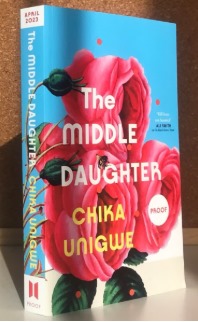
Set in the eastern region of Nigeria, specifically Enugu, The Middle Daughter tells the tragic story of Nani, a woman who was subjected to gender-based violence. The Nigerian author takes the readers on a journey of grief, gender-based violence, patriarchy, religious manipulation, loss, traumatic experience, and redemption.
The book’s first sentence, “I fear the man who is my husband,” sets the stage for more questions and a foreboding mood. Nani, the protagonist and middle child, is trapped in an abusive marriage by the sweet-talking preacher, Ephraim. In the mourning period of the death of her father and sister, Ephraim steals her, then breaks her, stripping her of any chance at immediate resistance, and finally traps her in the underbelly of his house as his wife. Instead of rescuing her, her mother abandoned her and forbade her younger sister from visiting her.
The belief that women need to make their bodies available to men makes Ephraim exploit and manipulate Nani as much as he wants. He played upon the age-old fear instilled in women that their worth hangs on societal approval. This makes them feel guilty for the mere fact of being a woman.
The Middle Daughter also revealed how religion extolled gender-based violence and patriarchy as virtues. Nani’s submissiveness, silence, and endurance for Ephraim’s abuse are seen as exemplary by the Chief pastor, who advised other Christian women to follow her ways. Chika spotlights how religion is used to justify male dominance as seen in Ephraim’s manipulative control, the church’s expectations of complete submission from Nani, and the chief pastor’s hypocrisy of Nani’s silence.
Nani’s separation from her family and reunion with them revealed how powerful a woman’s connection is. Nani’s transformation from a silenced and submissive wife to a woman seeking her freedom is a clear feminist stance—when women seek to reclaim their rights, even society can not stop them. Thus, it is not about being seen as the perfect or ideal woman. It’s about the impact of daring to be free.






